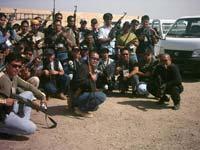Private armies abound in Asia

By Mata Press Service
Private armies, some stocked with ex-Canadian soldiers and cops, are expanding in Asia to cash in local insurgencies that threaten multinational corporations says a new study on private military companies.
With the war against terror, threat of global financial crisis and increasing piracy attacks, the general feeling of insecurity by foreign interests has increased significantly, creating a demand for the services of private military/security companies or PMSCs, states the report by the Chilean-based Global Consortium on Security Transformation.
“There is a common belief that the operations of PMSCs are largely confined to Africa and the Middle East. However, these entrepreneurial groups are expanding into Asia and in Southeast
Asia in particular,” noted Katherine Marie Hernandez, who authored the report.
The engagement of PMSCs as providers of security in the region, can be attributed to the need of private companies to protect their interests or businesses, which they think the
governments cannot adequately provide, stated the report.
However, the report points out that in several cases, especially in the Philippines these private armies act as armed auxiliaries used by the State against rebel groups.
They are armed by the State or by private interests (i.e., local warlords) and legitimized by their participation in campaigns against the enemies of the state, writes Hernandez.
“PMSCs may have expanded their operations into the region, but they have not yet been contracted to perform activities that are reserved for the armed forces. However, the region has experienced a revival of religious extremism together with a sharp sense of maintaining ethic identities and boundaries which could, in the future, provide fertile ground for armed conficts to arise.
The expansion of private armies in Asia and in particular Southeast Asia is directly linked to this, Hernandez concludes.
“Consequently, the overriding political climate characterizing the region has been one of armed conflict. Extremist groups in Southeast Asia are engaged in a violent conflict with their respective governments, such as `JI’ or Jemaah Islamiyah, a group which, although operating in the Philippines, has influence that extends beyond Philippine shores to Indonesia, Malaysia, and Singapore.”
PMSCs in particular, whose members are ex-military officers, are doing well in providing training for the armed forces in the region. For instance in Sri Lanka, the government hired PMC pilots to fly its gunships, while in Indonesia, the PMC Executive Outcomes provided training and support for the Indonesian Special Forces in hostage rescue operations in 1996. The training was in preparation for the Indonesian Special Forces operations in West Papua (Irian Jaya).
In Malaysia, TASK International trained the Royal Malaysian Police in close protection, hostage rescue, defensive driving and crisis management for the 1998 Commonwealth Games in Kuala Lumpur.
The report pointed out that the Philippine company Grayworks Security has employed a number of former members of Canada’s military and police forces as advisers to deal with the various armed groups in Mindanao engaged not only in kidnapping, but drug trafficking as well. Grayworks is said to have also provided some training to the North Cotabato provincial police and was hired by a number of big companies, including The Philippines’ Department of Labour and Employment or DOLE.
There have been reports that Grayworks is engaged in combating elements of the guerrilla organizations of the Moro Islamic Liberation Front (MILF), Abu Sayyaf, and the New Peoples’ Army (NPA), primarily on the island of Mindanao.
For instance, ‘Pentagon’ a gang formed by the MILF, has been involved in kidnap-for-ransom of foreigners and conducted attacks on the DOLE Plantation in Polomolok, South Cotabato and even tried to abduct the DOLE Regional Director.
In 2000, Filipino troops and a Grayworks trainer went on a mission to Jolo Island (in Mindanao) in search of Abu Sayyaf after 21 foreign tourists were taken hostage.
It is not clear whether it was the Philippine government that tapped Grayworks or the governments of those taken as hostages.
Hernandez stated that in 2005, an ex-Canadian Army soldier, ‘William,’ was reported to have led a team for Grayworks that were tapped by Mayor Efren Piñol, Sr. of Magpet in Southern Philippines, to train the mayor’s private army with a force of 12-15 men.
According to the story, the mayor asked the Canadian for help after the town was raided by members of the New People’s Army (NPA).
Without firing a single shot, the NPA disarmed the town’s police force and carted away 24 high-powered rifles and handguns.
Piñol was reportedly upset with the ineffectiveness of the military in protecting his town during the NPA raid and turned to the private army for help.
Mayor Piñol’s justification in tapping Grayworks is that the Armed Forces of the Philippines (AFP) could not be relied on to effectively addresses the NPA situation in his town. When asked for help, members of the AFP stationed in the area could not immediately respond given the chain of command and they could not respond to NPA raids/attacks without prior orders from their senior officers.
The Asia Times said that the Philippines’ combined number of private army employees outnumber the Armed Forces of the Philippines (AFP) and the Philippine National Police (PNP).






